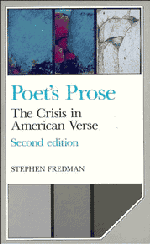Book contents
- Frontmatter
- Contents
- Preface to the second edition
- Preface to the first edition
- List of abbreviations
- Introduction: Prose and the American crisis of verse
- 1 The generative sentence: William Carlos Williams's Kora in Hell: Improvisations
- 2 “A life tracking itself”: Robert Creeley's Presences: A Test for Marisol
- 3 “He chose to include”: John Ashbery's Three Poems
- 4 The crisis at present: talk poems and the new poet's prose
- Notes
- Index
- Cambridge Studies in American Literature and Culture
Introduction: Prose and the American crisis of verse
Published online by Cambridge University Press: 04 April 2011
- Frontmatter
- Contents
- Preface to the second edition
- Preface to the first edition
- List of abbreviations
- Introduction: Prose and the American crisis of verse
- 1 The generative sentence: William Carlos Williams's Kora in Hell: Improvisations
- 2 “A life tracking itself”: Robert Creeley's Presences: A Test for Marisol
- 3 “He chose to include”: John Ashbery's Three Poems
- 4 The crisis at present: talk poems and the new poet's prose
- Notes
- Index
- Cambridge Studies in American Literature and Culture
Summary
We are trying with mortal hands to paint a landscape which would be a faithful reproduction of the exquisite and terrible scene that stretches around us.
John Ashbery, Three PoemsIn 1972 John Ashbery published a 118-page book of prose, divided into three sections, that he called Three Poems. What is meant by such a gesture? How are we to read a prose text that an American poet conceives of as poetry? The present study is an attempt to pursue that question along two avenues: first, by a detailed reading of Ashbery's text and of two other long works of prose by American poets, William Carlos Williams's Kora in Hell: Improvisations (1920) and Robert Creeley's Presences: A Text for Marisol (1976); and second, by a theoretical and historical consideration of the place of prose works in the canon of American poetry, which includes the latest developments in poet's prose.
I was initially led to undertake this study through my engagement – both as writer and reader – with contemporary prose by poets. I have felt for a number of years that the most talented poets of my own postwar generation and an increasing number from previous generations have turned to prose as a form that, in its pliancy and its linguistic density, seems to promise “a faithful reproduction of the exquisite and terrible scene that stretches around us.”
- Type
- Chapter
- Information
- Poet's ProseThe Crisis in American Verse, pp. 1 - 13Publisher: Cambridge University PressPrint publication year: 1990



